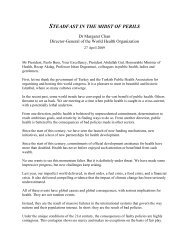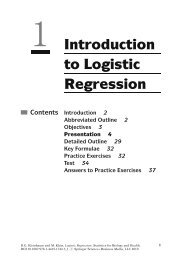The Evolution of HTA in Emerging Markets Health-Care ... - TREE
The Evolution of HTA in Emerging Markets Health-Care ... - TREE
The Evolution of HTA in Emerging Markets Health-Care ... - TREE
Create successful ePaper yourself
Turn your PDF publications into a flip-book with our unique Google optimized e-Paper software.
OHE Consult<strong>in</strong>g Report for PhRMA<br />
5 January 2011<br />
Industry perspective<br />
Industry has argued that <strong>HTA</strong> should serve as a reference tool rather than a mandatory process: it<br />
can only play a mean<strong>in</strong>gful role when several critical conditions are met, <strong>in</strong>clud<strong>in</strong>g availability <strong>of</strong> -‐<br />
sufficient data and evaluation standards. In the short-‐run, Ch<strong>in</strong>a is unlikely to roll out <strong>HTA</strong>. <strong>The</strong><br />
recent negotiations between the government and the pharmaceutical <strong>in</strong>dustry <strong>in</strong>dicate that the<br />
government is not well prepared for such negotiations. Experience with the Essential Drug List<br />
reform shows how <strong>in</strong>efficient it can be if a policy is put forward without sufficient <strong>in</strong>formation.<br />
Ideally, an <strong>HTA</strong> organisation should be <strong>in</strong>dependent to avoid bias even if it is affiliated with<br />
government <strong>in</strong>stitutions. <strong>HTA</strong> should take the role <strong>of</strong> balanc<strong>in</strong>g patient access and cost-‐conta<strong>in</strong>ment<br />
for the government and should not be used a cost-‐sav<strong>in</strong>g tool only. <strong>HTA</strong> should take a broad view <strong>of</strong><br />
value, and should not just look at drugs.<br />
<strong>The</strong>re are problems <strong>in</strong> conduct<strong>in</strong>g studies <strong>in</strong> Ch<strong>in</strong>a. Most hospitals are state-‐owned with hospital<br />
charges tightly controlled below cost. <strong>The</strong> data developed from this k<strong>in</strong>d <strong>of</strong> system will not be<br />
suitable for a rigorous <strong>HTA</strong> analysis, which assumes prices reflect resource use. Currently, the<br />
Ch<strong>in</strong>ese government has its eyes on the Australian and Korean systems but these countries have<br />
very different healthcare systems to Ch<strong>in</strong>a.<br />
A6.3 Taiwan<br />
Industry View<br />
In <strong>in</strong>dustry <strong>in</strong>terviewees commented that the current role <strong>of</strong> <strong>HTA</strong> <strong>in</strong> Taiwan is very limited. It is not<br />
actually used and may not be needed for cost control given the other constra<strong>in</strong>ts, especially the<br />
global budget. <strong>HTA</strong> is not currently used <strong>in</strong> drug pric<strong>in</strong>g. <strong>HTA</strong> (i.e., cost-‐effectiveness) is only used as<br />
an argument when a drug is rejected. In its appraisal, the Drug Benefit Committee will read the <strong>HTA</strong><br />
report produced by the Division <strong>of</strong> <strong>HTA</strong> (D<strong>HTA</strong>) <strong>in</strong> the Center for Drug Evaluation (CDE).<br />
Currently, the BNHI is the sole payer, and there are no clear rules or policies for apply<strong>in</strong>g <strong>HTA</strong>. <strong>The</strong>y<br />
decide who can participate <strong>in</strong> the discussion. Furthermore, current <strong>HTA</strong> is only a systematic review<br />
<strong>of</strong> other developed countries’ reports: no local Taiwanese analysis or model is required or provided.<br />
<strong>The</strong> <strong>HTA</strong> <strong>in</strong>formation is not dissem<strong>in</strong>ated though it should be—as part <strong>of</strong> a transparent process.<br />
<strong>The</strong> CDE-‐<strong>HTA</strong> pilot project (the D<strong>HTA</strong>) is beg<strong>in</strong>n<strong>in</strong>g to ask companies to make a submission. Some <strong>in</strong><br />
<strong>in</strong>dustry have asked: Why should companies participate <strong>in</strong> this if it is eventually go<strong>in</strong>g to be used <strong>in</strong><br />
pric<strong>in</strong>g—but not <strong>in</strong> a well-‐def<strong>in</strong>ed way-‐-‐it is just creat<strong>in</strong>g another hurdle for companies? This<br />
comment may be <strong>in</strong> response to the new drug reimbursement application form which was<br />
announced by BNHI to become effective on Nov 1, 2010. This form was revised by CDE-‐<strong>HTA</strong> team at<br />
the request <strong>of</strong> the BNHI.<br />
From a historical perspective, <strong>HTA</strong> <strong>in</strong> Taiwan could be described as the one-‐<strong>of</strong>f bra<strong>in</strong>-‐child <strong>of</strong> an ex-‐<br />
CEO <strong>of</strong> the BNHI that resulted <strong>in</strong> this pilot project. <strong>The</strong> project was headed by a scholar who aimed<br />
111








